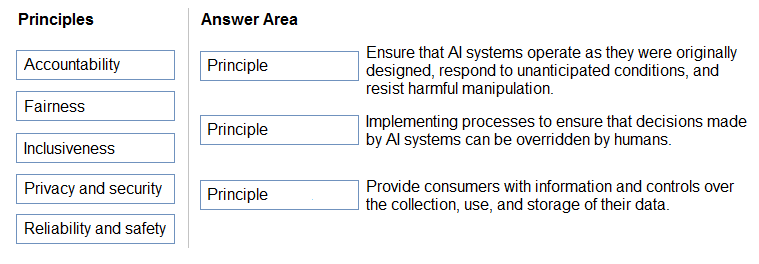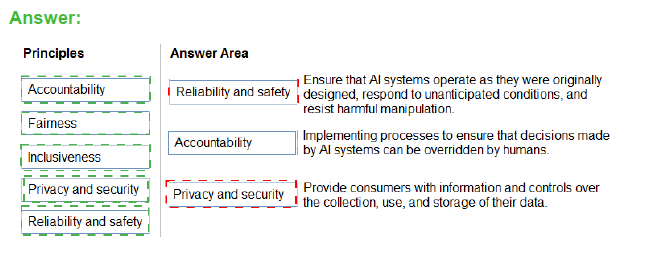
- Email support@dumps4free.com

Topic 5: Describe features of conversational AI workloads on Azure
Which machine learning technique can be used for anomaly detection?
A. A machine learning technique that understands written and spoken language.
B. A machine learning technique that classifies objects based on user supplied images.
C. A machine learning technique that analyzes data over time and identifies unusual changes.
D. A machine learning technique that classifies images based on their contents.
You have a dataset that contains experimental data for fuel samples.
You need to predict the amount of energy that can be obtained from a sample based on its
density.
Which type of Al workload should you use?
A. Classification
B. Clustering
C. Knowledge mining
D. Regression
Select the answer that correctly completes the sentence.

Match the Microsoft guiding principles for responsible AI to the appropriate descriptions.
To answer, drag the appropriate principle from the column on the left to its description on the right. Each principle may be used once, more than once, or not at all.
NOTE: Each correct selection is worth one point.


Box 1: Reliability and safety
To build trust, it's critical that AI systems operate reliably, safely, and consistently under normal circumstances and in unexpected conditions. These systems should be able to operate as they were originally designed, respond safely to unanticipated conditions, and resist harmful manipulation.
Box 2: accountability
Box 3: Privacy and security
As AI becomes more prevalent, protecting privacy and securing important personal and business information is becoming more critical and complex. With AI, privacy and data security issues require especially close attention because access to data is essential for AI systems to make accurate and informed predictions and decisions about people. AI systems must comply with privacy laws that require transparency about the collection, use, and storage of data and mandate that consumers have appropriate controls to choose how their data is used
For a machine learning progress, how should you split data for training and evaluation?
A. Use features for training and labels for evaluation.
B. Randomly split the data into rows for training and rows for evaluation.
C. Use labels for training and features for evaluation.
D. Randomly split the data into columns for training and columns for evaluation.
| Page 11 out of 53 Pages |
| Previous |